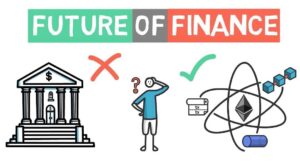THE FUTURE OF FINANCE : DeFI vs BANKS AND THE RISE OF CRYPTO

The world of finance is going through a massive transformation. The way people invest, borrow, and save money is changing forever. Traditional banks face increasing challenges from alternative solutions like decentralised finance (Defi) platforms and crypto lending services. Here, I explore the impact of these developments on the financial industry and how they’ll shape the future of finance.

In December of 2018, the world of finance was shaken to its core when The New York Times published an article with the sensational title “The Crisis Next Time.” The report outlined the risks associated with a new asset class called collateralised lending obligations (CLOs) and how these instruments could trigger another financial crisis. This news came hot on BlackRock Chairman Larry Fink’s announcement that he is worried about another financial meltdown and is lobbying for more stringent regulations for financial institutions. If you ask yourself what this has to do with the future of finance, you are not alone. As it turns out, both CLOs and crypto assets are examples of a more significant trend in our current financial system that we might call Defi vs Banks: Defi (Decentralized Finance), meaning distributed ledgers, smart contracts, and digital tokenisation as alternatives to centralised banks; vs Banks — trust-based structures versus transparent code-based systems. All this means that we stand at a crossroads between old and new paradigms regarding how we handle money and finances as a society.

What is Defi?
Decentralised Finance (Defi) is a growing movement in the financial industry which seeks to challenge the hegemony of traditional banks and financial institutions by offering accessible, open-source, decentralised financial services. In other words, Defi is the next-gen financial institution that brings more fairness and transparency to the way we save, borrow and invest money. Decentralised finance brings transparency, efficiency, and righteousness to the financial services industry. The rise of Decentralized Finance will transform the way we save, borrow and invest money and democratise financial services for the masses.

Decentralised Finance (Defi)
Decentralised finance is a term often used in the context of decentralised assets and trading platforms. While decentralised assets refer to the type of cryptocurrencies that any government or central authority do not control, decentralised trading platforms are a new breed of trading platforms that are not under the control of any central authority. Decentralised finance shares many similarities with decentralised computing and storage as both are based on a peer-to-peer (P2P) network. No centralised management oversees the system or controls the money flow in decentralised finance. Instead, the system gets managed by an extensive network of computers owned and operated by different participants.

The Rise of Crypto
Decentralised finance gained a lot of attention with the rise of crypto trading and the launch of crypto lending services. The meteoric rise of cryptocurrencies like Bitcoin, Ethereum, and others has transformed the finance landscape and significantly affected other industries. The rise of crypto has also had a significant impact on the way people invest and spend money. More and more people are using cryptocurrencies as a means of payment, and some even prefer to invest in cryptocurrencies over traditional assets like stocks and real estate. And, with the launch of crypto lending services on blockchain-based platforms, it is now easier than ever to tap into credit and financing. These developments are transforming how people save, borrow, and invest money, and lending services are now more accessible than ever. These transformations are having a significant impact on the overall financial industry and the way banks and financial institutions operate.

The Future of Banking
As the shift towards decentralised finance continues, the future of banking is increasingly becoming uncertain. Banks risk losing their monopoly on finance, and their services and products will increasingly become redundant. Banks might even disappear from the landscape altogether as more and more people look for decentralised alternatives like decentralised finance. With the rise of decentralised finance, banks will lose their monopoly on lending and become irrelevant. More people will start using blockchain-based lending platforms to secure financing, which will be cheaper, quicker and more transparent than the current system. The future of finance is decentralised, more affordable, and more transparent. Decentralised finance platforms will open new avenues for people to access financing at lower costs and in less time.

How Blockchain Will Transform Finance
The creation of Blockchain technology appears to have happened with decentralised finance in mind. Many experts believe that blockchain got created to disrupt the financial industry and challenge the hegemony of traditional banks. However, it took a few years for the blockchain industry to mature enough to question how we save, borrow and invest money. Now, with the rise of crypto, blockchain-based decentralised finance platforms, the evolution of blockchain technology is complete. Decentralised finance platforms function similar to blockchain-based ecosystems. The critical difference is that they use blockchain technology to facilitate decentralised trading. Using smart contracts, decentralised finance platforms create a transparent, secure, and efficient environment for people to trade assets or borrow money.

Final Words
The financial services industry has undergone dramatic changes over the last decade. The industry has seen its ups and downs, from disgruntled banks to demanding customers and digital natives. The past few years have been particularly challenging for banks, stock brokers, credit card companies, and other financial services firms. Many users are frustrated with high fees and complex contracts that put them at risk instead of protecting them. Recent scandals like the Wells Fargo fake-accounts debacle haven’t helped either.

The rise of blockchain technology is transforming the way we save, borrow, and invest money. Decentralised finance is increasingly becoming the preferred avenue for people to access financing. As blockchain technology grows, decentralised finance will become more robust and transformative.
 Dr. K.Jayanth Murali is an IPS Officer belonging to 1991 batch. He is borne on Tamil Nadu cadre. He lives with his family in Chennai, India. He is currently serving the Government of Tamil Nadu as Director General of Police, Idol Wing CID
Dr. K.Jayanth Murali is an IPS Officer belonging to 1991 batch. He is borne on Tamil Nadu cadre. He lives with his family in Chennai, India. He is currently serving the Government of Tamil Nadu as Director General of Police, Idol Wing CID

Oct 12, 2022 at 1:32 AM /
Ciao dear friends. My team members and I are happy we heard the articles here. Ive been hunting for this info for hours and I will be sure to tell my sisters to swing by. The other morning I was toggling through the top forums trying to find a solution to my revolving questions. Now I am definately to take it all the way in whatever method I can. We are getting all blurred out on the smart ideas we are observing. Moreover, I just hoped to thank you from the bottom of my heart for such beneficial knowledge. This has forced me out of unhealthy habits. Many bittersweet knowings are coming into my world. Its really a sure website to make new friends. I gotta mention also that I am studying. when you get a chance, take a look my new spot:[url=https://drywallpatchguys.com/best-drywall-repair-company-services-in-mission-viejo-ca/]bathroom wall textures near SUNLAND CA[/url]